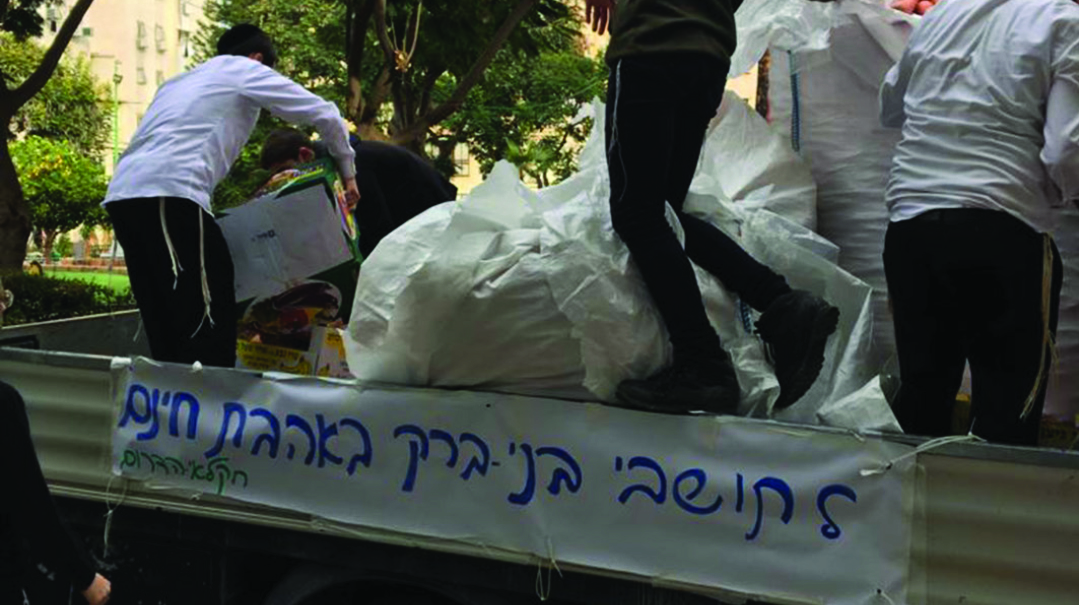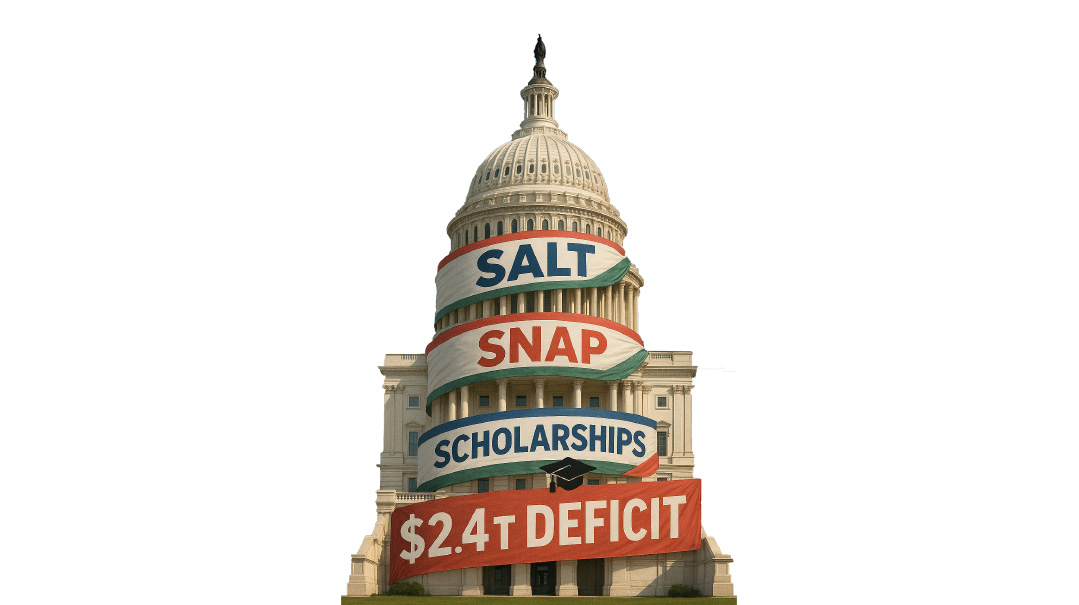“With Ahavat Chinam to the Residents of Bnei Brak”

"People in Eretz Yisrael aren’t taught to love one another. Mutual respect is the key on every issue. With that it’s possible to do anything”

The Backstory // Eliezer Shulman
At the height of the tense days in Bnei Brak last week, residents were surprised to find a truck dropping off tons of free agricultural produce next to the Be’er Miriam halls in the city. A large handwritten sign read: “With ahavat chinam to the residents of Bnei Brak, from southern farmers.”
The originator of the heartfelt gesture is Rikki Levitt, 60, mother of four and resident of Tekoa (a yishuv near Jerusalem’s Har Homa neighborhood) who works in real estate development. Appalled by media demonization of the city’s residents due to the fringe violence last week, Rikki decided to recruit farmers from Kibbutz Alumim, Saad, and Netivot, to donate almost 14 tons of agricultural produce for free distribution to Bnei Brak families.
The videos of her effort went viral, but she told Mishpacha that this isn’t the first time she’s made the trip: “It started on Erev Pesach, when the city was cordoned off from the rest of the country by police, and I saw a headline: ‘Fear of Humanitarian Crisis in Bnei Brak.’ I was shocked. I said it’s unbelievable that an entire city is placed under siege like that. I felt I had do to something.
“The simplest option,” she says, “was to provide the city with agricultural produce, because it was Erev Chag and many families were in financial trouble. I started contacting fruit and vegetable farmers, and they promised to donate their best produce.”
Did you realize that you would have a massive quantity of produce on your hands?
“I realized that my hands would be more than full, thanks to their eagerness to help. A friend of mine who’s a construction contractor lent me a truck, and with a volunteer driver we started picking up fruits and vegetables from across the country. We brought the truck to Bnei Brak and they let us in, despite the lockdown. And we started distributing the produce.
“The produce included mushrooms, herbs, avocados, peppers, onions, bug-free lettuce, and more — all high-quality produce in enormous quantities.”
So what happened this time around?
“Half a year goes by and the news is full of images of police attacking residents with batons and stun grenades. The streets of Bnei Brak were transformed into a war zone. I asked myself, whom are the cops fighting? What are the batons and stun grenades for? They’re waging war against a law-abiding community, good people. Over 200,000 live in the city. Fine, so there are a few bad apples on the margins, but does that justify collective punishment of an entire community? The entire city of Bnei Brak is going to be demonized and delegitimized? I felt like it was my duty to give voice to a different point of view.
“I decided to organize another delivery. I called the farmers, and they were again all glad to help and offered the cream of their crop. I realized that the broader public doesn’t buy the media’s attempts to blacken an entire city, and that greatly encouraged me.”
Do you have a message for the wider public?
“We need to prevent friction between the secular and religious communities. In Bnei Brak last week we saw the consequences of a poisoned atmosphere and mutual lack of respect. People in Eretz Yisrael aren’t taught to love one another. Mutual respect is the key on every issue. With that it’s possible to do anything.”
$600 billion
That’s the amount proposed by ten Republican senators for the new aid package sought by President Joe Biden — only a third of the amount that Biden himself wanted, which would have included a check for $1,400 per person, in addition to the $600 approved during the Trump administration.
While Biden argues that the high amount is required to open schools safely, on the Republican side there are those who say it is possible to open schools even without such cost. And while the president believes that every American who earns less than $75,000 a year should receive a check, his opponents believe that only those who earn less than $50,000 — or a household that earns less than $100,000 — should be eligible.
But beyond the numbers debate, this will also be a test of Biden’s bipartisanship. Among the proponents of the new plan are the most moderate Republicans: Mitt Romney, Lisa Murkowski, and Susan Collins. These are supposed to be the people most open to working with Biden. Will the president reach out to them, or choose to exercise his majority in Congress and move ahead regardless of the other party’s opinion?
—Omri Nahmias
Bureaucratic Bullies
So that’s what European Commission president Ursula von der Leyen meant by a “new beginning with a long-term friend.” Just five weeks after uttering these words about Britain and the hard-won Brexit deal, VDL, as her staff call her, gave impressive proof of that devotion.
It was a week in which the Commission came under fire across Europe for its sluggish procurement of COVID vaccines. So the bureaucrats set their sights on the millions of EU-manufactured doses promised to other countries that had been quicker off the mark in approving their use. They claimed that vaccines produced in AstraZeneca plants in Britain were intended for EU use — despite the fact that Britain had signed a contract with the company three months earlier than the giant bloc.
So in a move to pressure Britain, Brussels reached for the nuclear button on Friday night by calling for a “hard border” to be thrown up between British Northern Ireland and the Republic of Ireland, part of the EU. VDL apparently forgot her own January 2020 promise to “never, ever” endanger the Good Friday agreement governing Ireland by re-introducing a proper border. It took howls of protest from politicians (and headlines about “Brussels bullies”) on both sides of the Irish Sea to send the Commission into a humiliating retreat.
With friends like the European Union, British politicians must wonder, who needs enemies?
The Esrog Effect
"Washington’s public works department should have built an emergency system of drainage ditches, culverts, and tunnels to divert into the Potomac River the torrents of praise, approval, and adoration the press poured down on President Joe Biden on Inauguration Day.”
That witty assessment of the media’s kid-glove approach to President Biden is courtesy of Politico’s Jack Shafer. This week, a somewhat less self-aware writer at the same outlet went on to explain at length “why you haven’t seen a sit-down Biden interview yet.”
Reasons ranged from Biden being a “good delegator” to “restoring confidence with a public battered by the scorched-earth politics of the Trump years,” and finally that this president, unlike his predecessor, is “secure.”
Missing was one possibility: that Biden, as many suspected on the campaign trail, may not be up to an intensive grilling.
Israelis have a term for this type of media treatment: It’s called the “esrog effect.” It was coined by Amnon Abramovich, a left-wing Israeli commentator, in 2005. Back then, Prime Minister Ariel Sharon was under investigation for corruption, and had just called for the Gaza “disengagement.” The media needed to treat Sharon “like an esrog,” said Abramovich, because leaving Gaza was more important than the allegations against him.
Over in DC, the media — delighted at Trump’s ouster — are still apparently in esrog-tending, president-coddling mode. And at the rate they’re going, they might not snap out of it by Succos.
—Gedalia Guttentag
(Originally featured in Mishpacha, Issue 847)
Oops! We could not locate your form.












